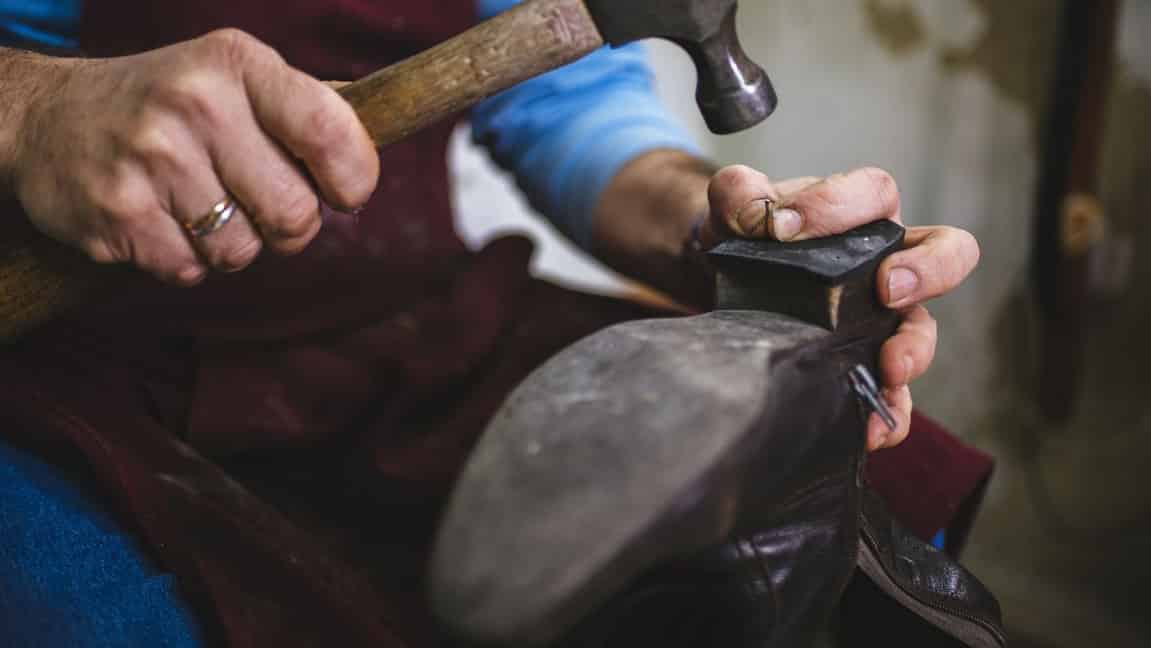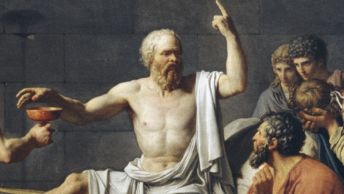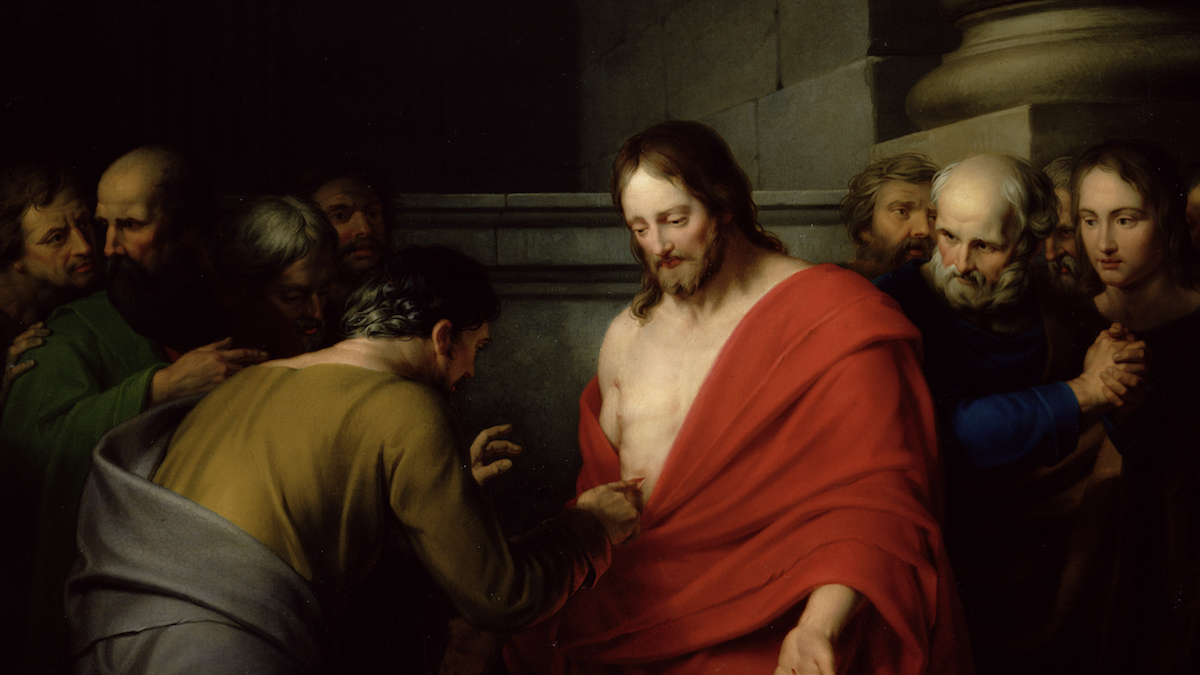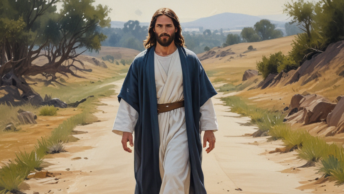Once upon a time there was a cobbler, or shoe-maker, who lived a simple lifestyle, worked hard, and was very happy with life; people passing his shop could hear him singing at the top of his voice as he fixed shoes, and he had a wave and a smile for everyone he saw. The town’s banker was a rich but unhappy man, and he wondered why this poor fellow was always in such a good mood; he visited him and asked point-blank, “How much money do you make each year?” The cobbler replied, “My family is seldom in want; some days I don’t sell any shoes, but I keep busy. I close the shop on holy days, of course, so there’s no income then; other days seem to make up for it. I can’t really answer your question because I don’t know how much money I make.” The banker was amazed and intrigued by this answer, and he said, “Because you’ve been so open in sharing your story with me, I’m going to give you 300 gold pieces. Use them whenever you have need.” The cobbler was overjoyed, and he hurried home and buried the money in a corner of his house beneath the floor. It seemed fortune had smiled upon him–but things began changing. For instance, if no one else from the family was at home, the cobbler would come home from the shop, just in case someone might break into the house and find his gold. At night he couldn’t sleep because he was too busy worrying that someone would try to steal his fortune. His friends noticed that he no longer sang with joy as he worked, and he became suspicious whenever someone stopped in the shop just to chat. The story has a happy ending, however. The cobbler realized what was happening, so he dug up the gold, took it back to the banker, and said, “Thank you for your generous gift, but I really can’t afford to be the owner of these coins. Please take them back, so that I may once again enjoy my singing, my sleep, and my friends–for it seems that when I buried the money, I buried my happiness at the same time” (Bausch, A World of Stories for Preachers and Teachers, #234.)
This simple shoemaker turned out to be a very wise and courageous man, capable of recognizing and choosing what really mattered–and his example speaks to us today. We must choose between the simple and often difficult way of Christ and the glittering and attractive way of the world. Our decision will determine whether we’re happy–and not only here on earth, but also in the life to come.
In the Gospel of Luke (16:1-13), Jesus states very clearly that it’s impossible to serve both God and money; one or the other will inevitably come first in our lives. How do we choose between them wisely? By remembering that money is only a tool; it is a means, not an end in itself. God allows us to earn money by our work, and sometimes by receiving gifts or benefitting from unexpected good fortune, so that our material needs can be met, and so that we might help meet the needs of others. It was never God’s plan that money become a rival to Himself, or that the accumulation of money become the goal of people’s lives. The prophet Amos (8:4-7) strongly condemned those whose greed led them to cheat the poor, instead of being honest and even charitable toward them. As St. Paul (1 Tm 2:1-8) says, Jesus is the mediator between God and humanity. This means we can’t buy our way into Heaven; we can only enter there by living as followers of Jesus. Money is a temporary tool meant to be used in helping us in this process. Our Lord praised the dishonest steward for at least being resourceful, even if in a devious way. We’re called to be just as clever using our earthly possessions, though in a much more honest and admirable way: by devoting our time, money, and abilities to the glory of God and to the assistance of those in need. As Jesus says, practicing good stewardship here on earth will allow God to entrust us with the riches of eternal life.
A wealthy man in Texas invited his pastor to his ranch for dinner, and afterwards, he led him outside to a place where he could show off his success. He boasted, “Twenty-five years ago I had nothing. Now, as you can see to the north, it’s all mine.” The rancher then pointed to his vast fields of grain in the east, saying, “It’s all mine.” Then he turned to the south, saying, “Those herds of cattle are all mine.” Finally, he pointed to the beautiful forest in the west and boasted, “It’s all mine.” He paused, expecting the pastor to praise him for his success. However, the clergyman pointed to the sky and asked, “How much do you have in that direction?” Hanging his head in shame, the rancher admitted, “I never thought of that” (Roy B. Zuck, The Speaker’s Quote Book, p. 257).
God will bless us with the riches of Heaven only if we show ourselves to be trustworthy in using the things of earth. On what basis will God judge us? Obviously, money or material wealth is one criterion. The Lord wants us to support His Church and to contribute to charity, being generous and, if possible, even tithing. Just as Monopoly money is only good for playing the game, and can’t be used in the real world, so it is foolish to cling to our money until we die, instead of using it now so as to help us reach Heaven. There may also be other ways in which we’re rich, and thus expected to help others. For instance, we may be blessed in knowing many people; we’re supposed to pray for them and witness to God’s love for them. We may have certain talents and abilities; we’re supposed to use them for the good of the larger community. We may have influence or authority over others; we’re supposed to give a good example and encourage virtue. We are rich in the sense of having the freedom to vote for our leaders and speak out about our society’s values and policies; we’re supposed to do our part in defending life and moral standards. We are rich in belonging to the one true Church founded by Jesus Christ; we’re supposed to be active members and to use the Holy Spirit’s gifts in helping transform the world.
The dishonest steward recognized the seriousness of his situation, took inventory, and settled accounts in a way that guaranteed his future. Jesus is calling us to be just as wise, diligent, and resourceful in preparing ourselves for eternity. Like the simple shoemaker, we must learn to recognize what truly matters, choose wisely, and follow through on our decision. If we do, we will find that wealth, happiness, and peace which lasts forever.








